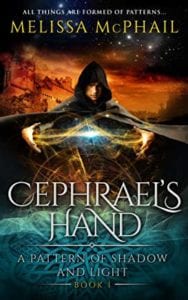
FINALIST of the 2016 Shelf Unbound Competition for Best Independently Published Book
“Cephrael’s Hand introduces the story of the First Lord Björn van Gelderan’s attempt to save his magical race from extinction and the brave (and sometimes unknowing) souls who play a role in this game.”
Shelf Unbound: How did you go about creating your main characters Bjorn van Gelderan, Prince Ean val Lorian, and Trell?
Melissa McPhail: I’m an organic writer (sometimes called a pantser, in the sense of “writing by the seat of your pants”), which means I do minimal planning and mostly let the story go where it wills. That also applies to characters. Basically, I don’t make up characters until the story calls for them. I liken it to the way that you don’t know who’s inside a tavern until you walk inside. Suddenly a scene spreads before you, and you have to describe it. Who’s waiting there? It’s always an exciting mystery to me.
When I first began writing this tale, 13 versions ago, it was a very different story. It actually began in another character’s first-person viewpoint—the boy named Tanis—and out of his viewpoint, both Ean and Björn appeared.
For those who know my series, this is a rather significant statement. When I’m writing in a character’s viewpoint, I am being that character to the best of my ability. I’m thinking like him or her, feeling like they feel, experiencing what they experience. Looking back on how Ean and Björn appeared into the story is actually rather profound for me, because in a sense, Tanis created them both. Tanis needed a prince to show up unconscious on his doorstep, and so Ean became. And in the back of this, Ean needed a reason to be unconscious, and so Björn became. If I’d started writing the story from any other viewpoint character, those two might never have become at all. What makes this so meaningful to me in retrospect is how intrinsic and vital Tanis is to the entire story now, but when I was writing the first book, he was simply an innocent boy.
In the same sense as the above, Trell appeared because of Ean. I can’t say more than this without spoilers.
Shelf Unbound: This is Book 1 in your A Pattern of Shadow & Light series. Did you map out what’s going to happen in the whole series before you began writing the first book?
McPhail: As you might guess from my answer above, I really had only the bones to work from, and they weren’t even assembled into any kind of form. I knew the conflict. I knew who stood behind it. I knew their motivations—because their motivations are central to the theme of the series—and I knew that Bjorn intended to do something about them. That is, I knew he had devised a plan. I knew that creating a new realm was part of that plan, but I really had no idea what he’d intended to accomplish through building T’khendar—it just sounded portentous, creating an entirely new world, whole-cloth, out of the aether, and it served as a compelling reason why Bjorn would’ve been ostracized and eventually branded a traitor.
Really, looking back on the path I’ve followed, it’s amazing this story makes sense. But that’s why I love writing organically, because you find true magic guiding the experience.
Shelf Unbound: What are the challenges of writing a series as opposed to stand-alone novels?
McPhail: I’ve never written a stand-alone novel, so I can’t speak to that, but there are many challenges in writing a series. Inventing a conflict that can span multiple books is definitely an important fundamental. Frequently I’ve come across a series that feels like the author only intended one book, because the conflict is mostly resolved in the first, but then suddenly they come out with two more books. It’s as if their publisher said, “Let’s make it a trilogy” and now the author is trying to extrapolate some additional conflict out of what remained from their first storyline. A series will definitely have a more holistic feel if the author has been working from the outset upon a conflict that cannot possibly be resolved in one book.
Shelf Unbound: What authors or novels have influenced your writing?
McPhail: Honestly, all of them. I take away something new from every book I read, because I can never quite read only for pleasure. If a particular turn of phrase strikes me, I’ll stop and analyze it for structure. With that said, Victor Hugo is my go-to master for prose. His use of metaphor is unparalleled. I read Les Miserables before starting each new book my series. When I’ve been immersed in Hugo’s work and have his language in my head, I find it draws out the lyricism in mine.
Shelf Unbound: You are a musician and composer. What are the similarities of writing fiction and writing music?
McPhail: You’re weaving a tapestry of images and emotion with both mediums. They’re just not woven with the same thread.
